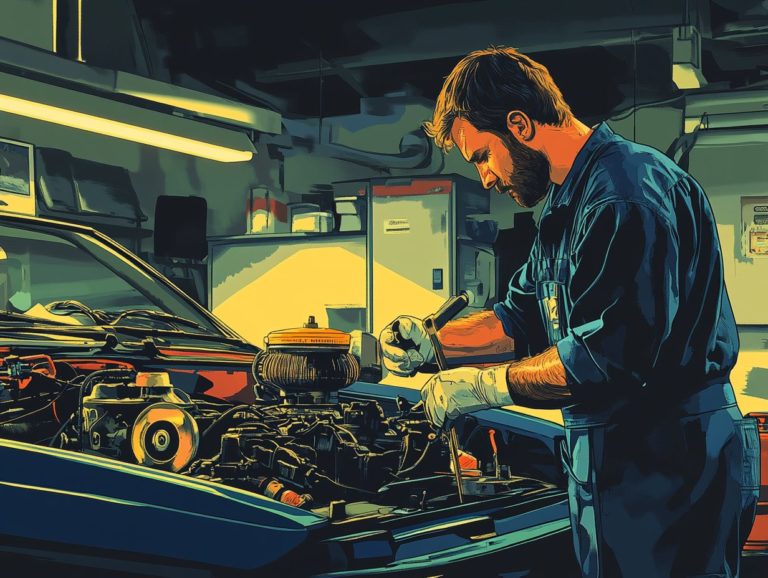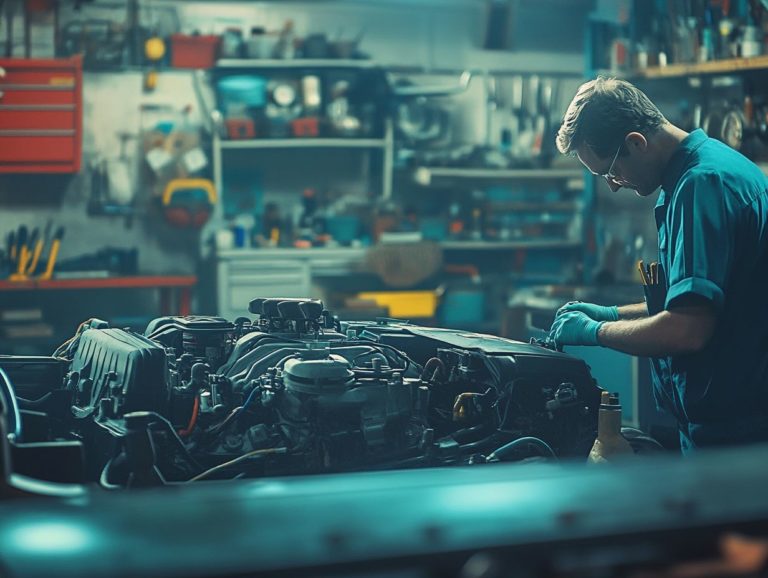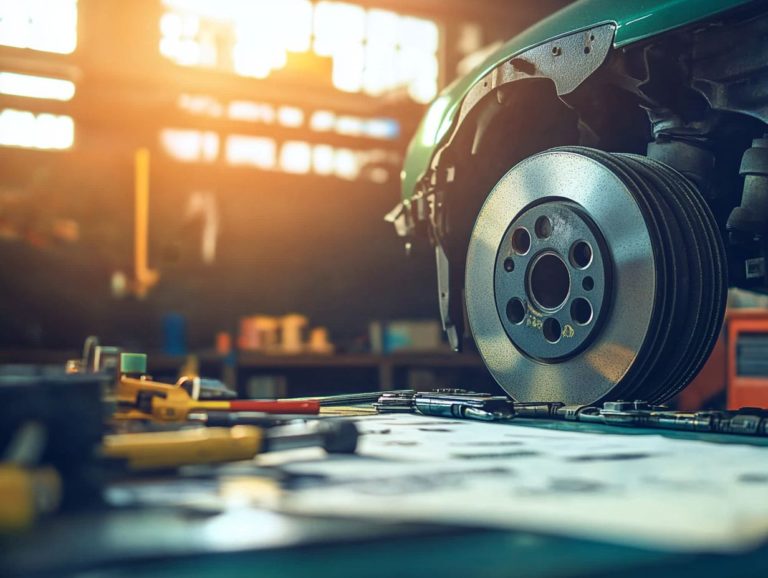Identifying Common Fuel Pump Problems
Fuel pumps are essential for keeping your vehicle running smoothly. They deliver fuel from the tank to the engine. When these components begin to fail, you may experience frustrating performance issues and costly repairs.
In this exploration, you ll discover the signs of a failing fuel pump, the common reasons behind these problems, and effective methods to diagnose and address them. You’ll also find valuable tips on maintaining your fuel pump, helping you to prevent future issues.
Act now to keep your vehicle running like new!
Contents
Key Takeaways:
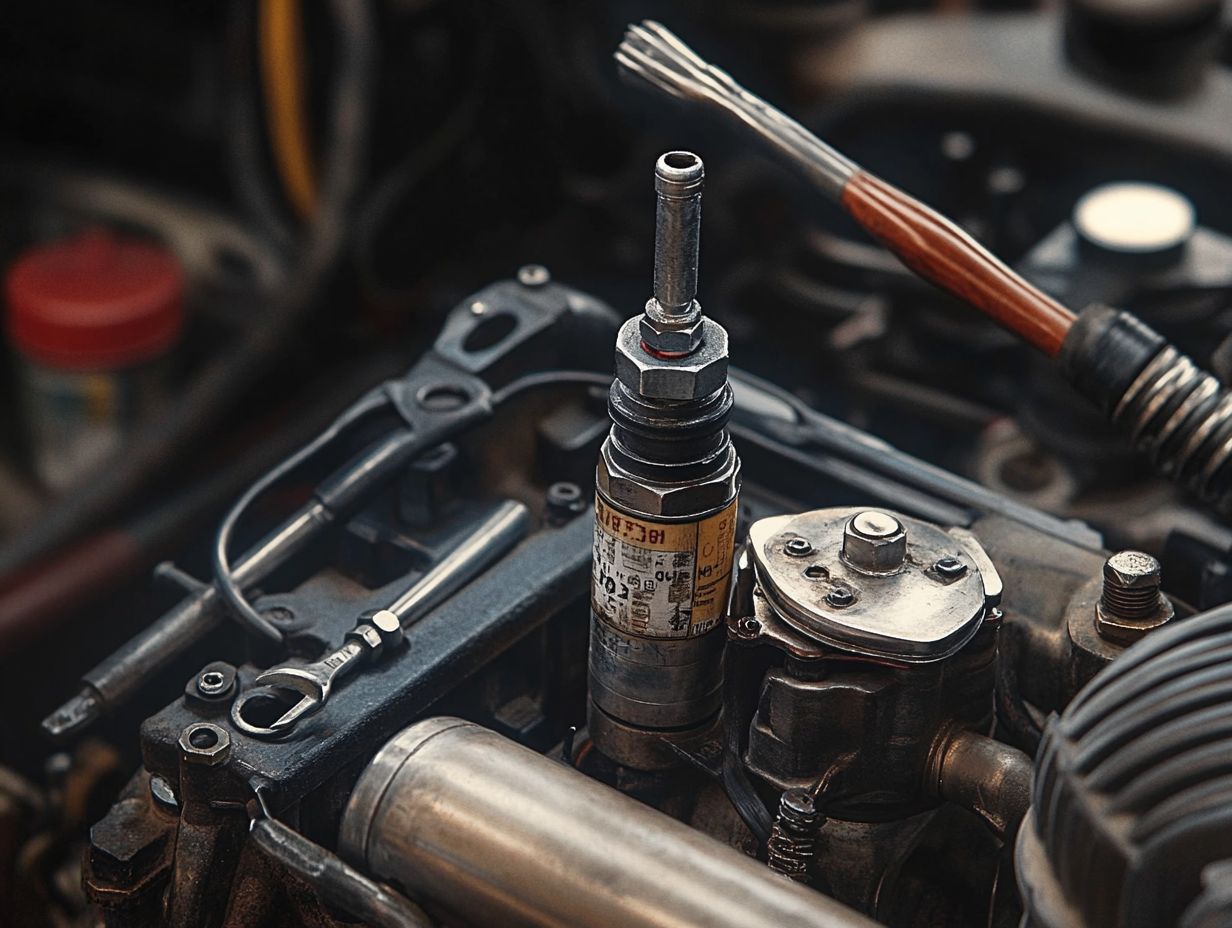
- A fuel pump delivers gas to the engine and can malfunction due to various issues.
- Signs of a failing fuel pump include engine sputtering, difficulty starting, and low fuel pressure.
- Common causes include clogged filters, electrical issues, and wear and tear.
Overview of Fuel Pump Problems
Understanding fuel pump issues is essential for vehicle owners. These components help maintain optimal vehicle performance by effectively regulating the fuel system.
When a fuel pump malfunctions, you might experience poor fuel efficiency, leading to an engine that sputters or stalls. It could even trigger that dreaded check engine light.
Fuel pump troubles can arise from several factors, including wear and tear, contamination in the fuel tank, or an overheating pump. Each of these can significantly impact your vehicle’s operation.
What is a Fuel Pump and Its Function?
A fuel pump is a vital part of your vehicle’s fuel system. It is responsible for delivering fuel from the tank to the engine, ensuring efficient combustion.
This crucial component generates the pressure needed to propel fuel through various lines. This guarantees it arrives at the injectors, where it mixes with air for optimal ignition.
You’ll encounter different types of fuel pumps, including:
- Mechanical pumps, commonly found in older vehicles.
- Electric fuel pumps, which dominate modern designs.
The electric fuel pump, often located within the fuel tank, boosts fuel delivery efficiency and cools itself during operation. By working with components like fuel filters and injectors, the fuel pump enhances your vehicle s engine performance and reliability.
Signs of a Failing Fuel Pump
Recognizing the signs of a failing fuel pump is crucial for maintaining your vehicle s performance and preventing further damage. Look for common symptoms such as engine sputtering, stalling, and surging.
These red flags may indicate fuel pump problems that could escalate into more significant issues if left unaddressed.
Common Symptoms to Look Out For
Signs that your fuel pump may be failing include engine misfires, difficulties starting your vehicle, and erratic engine temperature.
You might notice a dip in fuel efficiency as your engine struggles. This often results in a noticeable decline in acceleration, making it hard to reach your desired speed.
Low voltage situations can make these problems worse, leading to erratic fuel pressure that affects engine behavior. Symptoms like sputtering during acceleration or occasional stalling may occur, often due to insufficient power reaching the fuel system.
If these issues are ignored, they can progress into severe mechanical failures. It s essential to stay attentive to these early warning signs.
Causes of Fuel Pump Problems
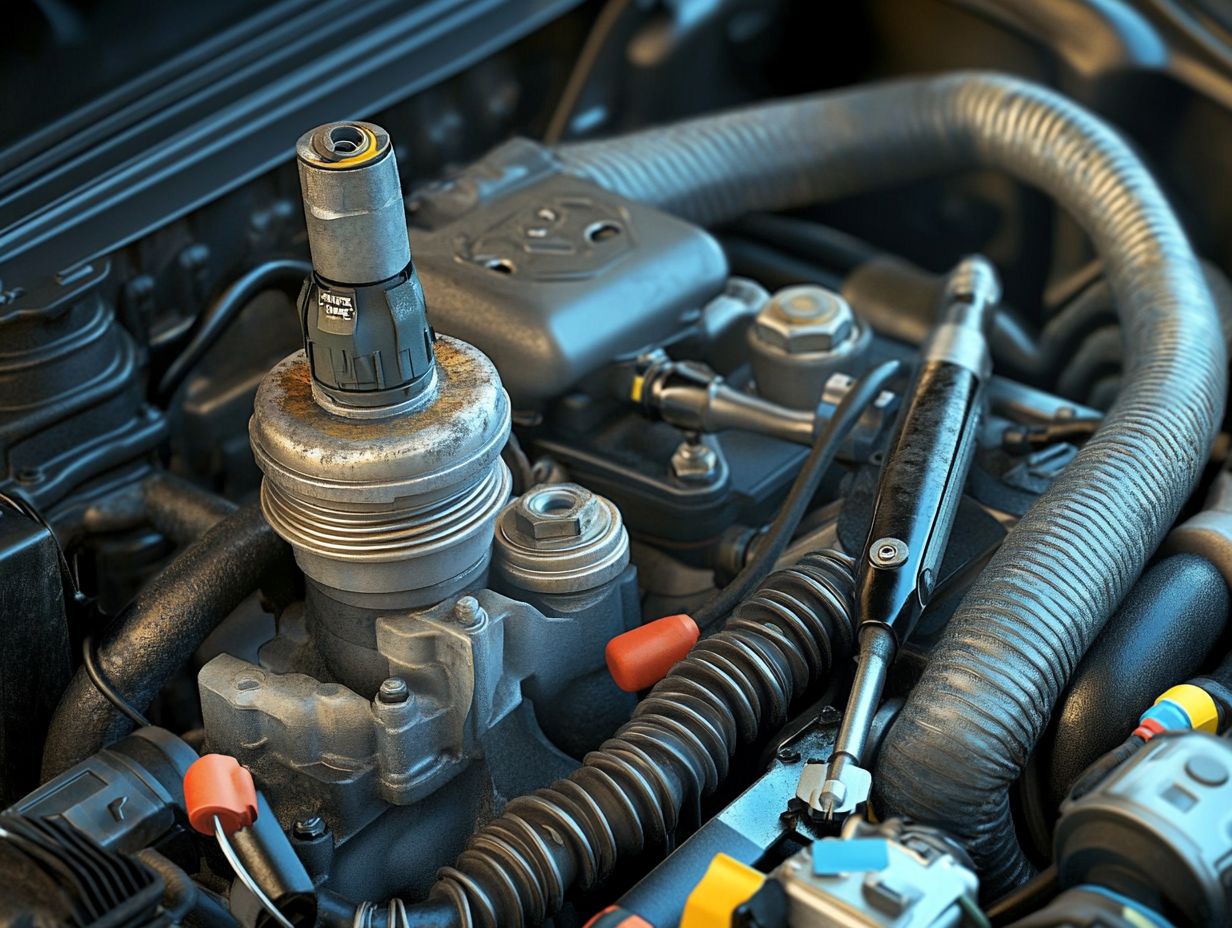
Several factors can lead to fuel pump issues, making it vital to diagnose the problem for effective automobile maintenance. Common culprits include poor fuel quality, clogged fuel lines, and wear on mechanical parts each impairing the performance and efficiency of your fuel pump.
Taking the time to identify these issues ensures your vehicle operates smoothly and reliably.
Factors that Contribute to Malfunction
Several factors can lead to a malfunctioning fuel pump, including high-temperature symptoms, a faulty fuel pump relay, and a clogged fuel filter.
Understanding these elements is essential for maintaining the efficiency of your entire fuel system. High temperatures wear down pump parts over time, hindering performance and possibly resulting in complete failure.
A malfunctioning relay disrupts the electrical supply to the pump, causing it to operate erratically or not at all. A clogged fuel filter restricts fuel flow, forcing the pump to work harder and accelerating wear.
To keep your fuel system in top shape, regular cleaning and maintenance are crucial. By ensuring that each component operates at its best, you enhance both longevity and reliability.
Diagnosing Fuel Pump Issues
Diagnosing fuel pump issues is crucial for ensuring your vehicle performs at its best. You ll typically want to use tools such as a fuel pressure gauge (which measures the fuel pressure supplied to the engine) and consult with a skilled mechanic.
By understanding the symptoms and conducting a comprehensive vehicle inspection, you can effectively pinpoint any problems related to the fuel pump. Taking these steps enhances your driving experience and prolongs the life of your vehicle.
Methods for Identifying the Problem
Identifying fuel pump problems involves several effective methods. Start by checking the fuel pump s functionality at high speeds or ensuring the ignition is turned on during diagnostic tests.
Listen for any unusual sounds while the vehicle is running. A whirring noise could indicate that the pump is struggling or on the verge of failure.
Observing fuel pressure readings with a gauge is crucial, as a drop in pressure might indicate that the pump isn t delivering enough fuel to the engine. Don t overlook the condition of the fuel filter, as blockages can significantly impact performance.
A visual inspection of the electrical connections and wiring related to the fuel pump is essential. This can help you uncover any issues that might hinder optimal operation, ensuring a smoother driving experience and maintaining your vehicle’s performance.
Repairing or Replacing a Fuel Pump
Deciding whether to repair or replace a fuel pump is pivotal for any vehicle owner. The options can vary significantly in both cost and methods of addressing the issue.
By understanding the components within the fuel pump assembly, you enable yourself to make well-informed decisions during your automobile repair process.
Costs and Options for Fixing the Issue
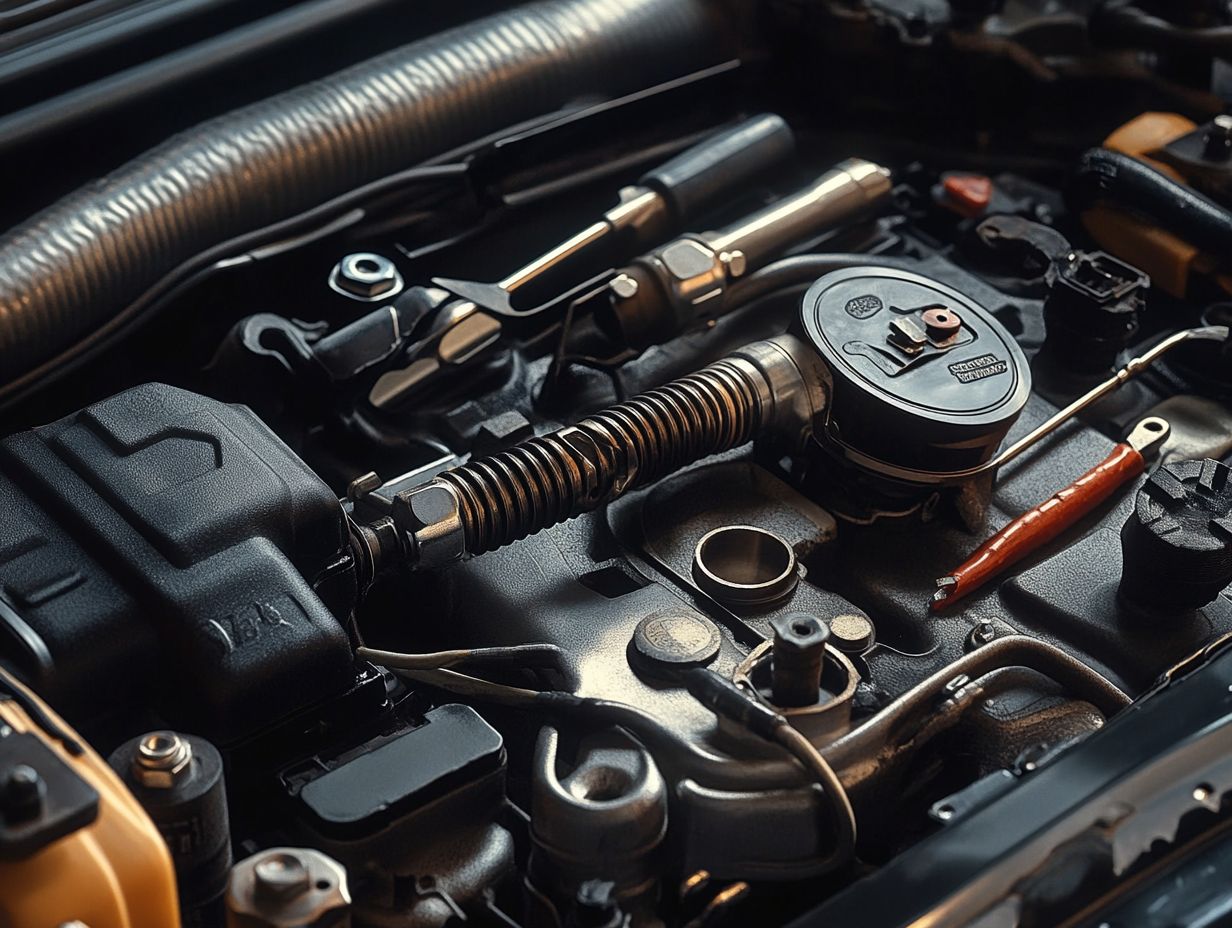
The costs of repairing or replacing a fuel pump can vary greatly, depending on whether you choose an OEM (Original Equipment Manufacturer) fuel pump or a more economical aftermarket option.
Many vehicles typically require fuel pump replacements between 50,000 and 200,000 miles.
For example, average labor costs hover between $100 and $150 per hour, influenced by the job’s complexity and local labor rates.
If you re leaning towards an OEM fuel pump, expect to spend between $300 and $800. On the other hand, aftermarket alternatives might be easier on the wallet, averaging around $200 to $500.
As a vehicle owner, consider the potential long-term savings that OEM parts could offer. They often come with longer warranties and superior reliability. By weighing these costs and benefits, you can make informed decisions when tackling fuel pump issues, balancing affordability with quality.
Preventing Fuel Pump Problems
Prevent fuel pump problems now to keep your vehicle running smoothly! This starts with consistent maintenance practices and a keen eye on fuel quality.
Incorporating a routine fuel system cleaning not only extends the lifespan of your fuel pump but also elevates your vehicle’s overall performance.
How to Keep Your Fuel Pump Healthy
To keep your fuel pump healthy, focus on fuel quality. Change the fuel filter regularly and check the entire fuel system.
Always keep your tank at least half full. This helps prevent the pump from overheating and wearing out quickly.
Check for leaks in the fuel lines. Make sure all connections are secure to help your fuel pump perform at its best.
Watch your dashboard warning lights closely. They can give early warnings of possible fuel system problems.
By following these tips, you can help your fuel pump work smoothly and last longer.
Frequently Asked Questions
What are common symptoms of a faulty fuel pump?
Some common signs of a bad fuel pump include difficulty starting the car, sputtering or stalling while driving, and a decrease in fuel efficiency.
How can I determine if my fuel pump is the cause of my car not starting?
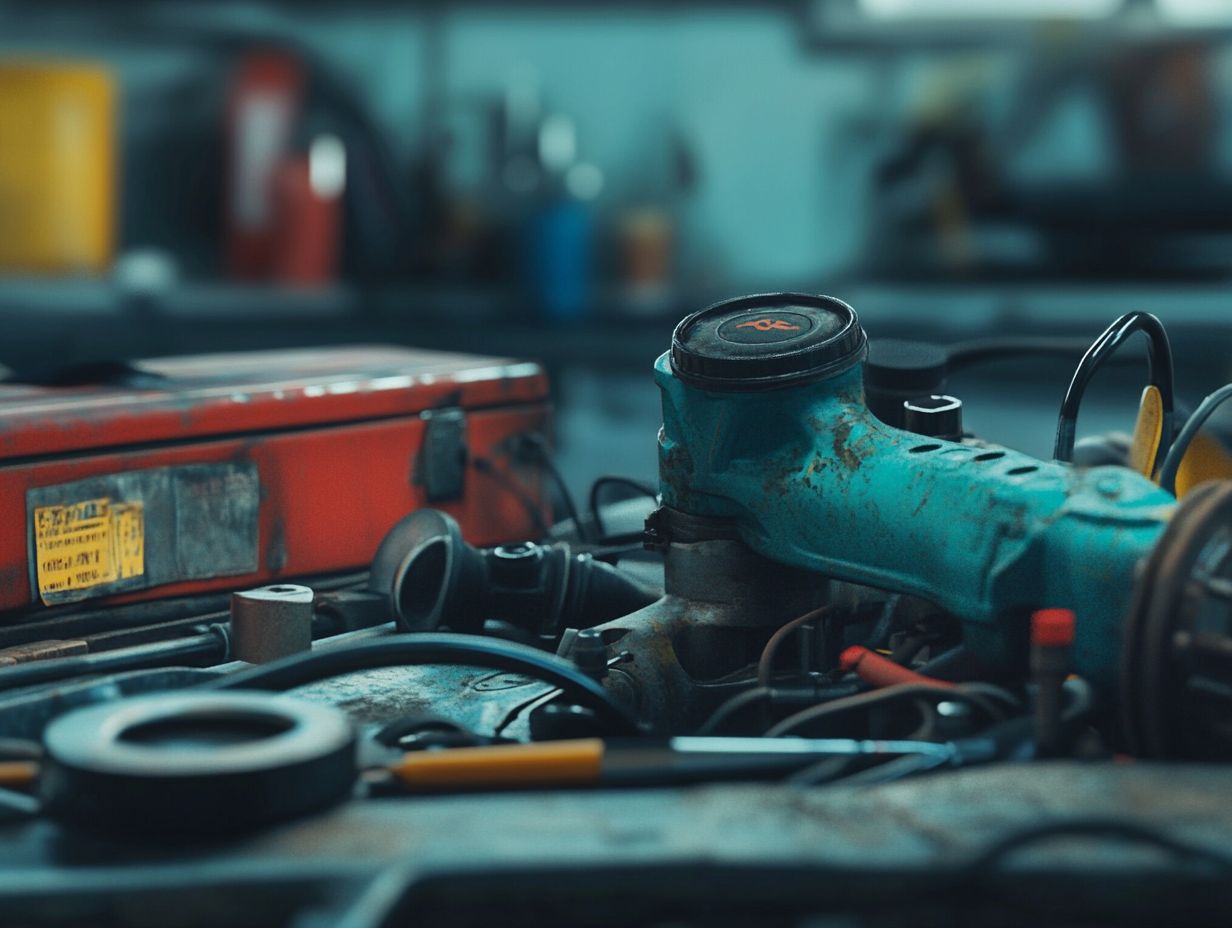
You can use a fuel pressure gauge to check the fuel pressure. Ensure it falls within the manufacturer’s recommended range. If the pressure is too low, it could indicate a problem with the fuel pump.
What could cause a fuel pump to fail?
A fuel pump can fail due to various reasons, such as a clogged filter, a worn-out motor, or electrical issues. Contaminated fuel or frequently running on a low fuel level can also contribute to pump failure.
Is it possible to repair a faulty fuel pump?
In most cases, it is not possible to repair a faulty fuel pump. It will need to be replaced with a new one. However, if the issue is caused by a clog or debris, cleaning or replacing the fuel filter may solve the problem.
Can a bad fuel pump cause engine damage?
Yes, a failing fuel pump can cause damage to the engine if it is not addressed in a timely manner. This is because the fuel pump is responsible for delivering fuel to the engine, and if it fails, the engine may not receive enough fuel to function properly.
How often should the fuel pump be inspected?
There is no set time frame for inspecting a fuel pump, but it is recommended to have it checked during routine maintenance or if you notice any symptoms of a failing pump. It is also important to follow the manufacturer’s recommended maintenance schedule for your specific vehicle.


